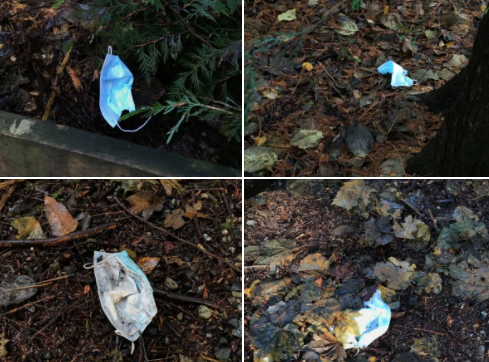Whether they fall out of your pocket or are thrown on the ground, discarded masks can cause problems for fish and animals.
That’s the warning from a Coquitlam stream keeper group that posted on Facebook this week photos of masks found along the Hoy Creek linear trail.
Masks have also been found in the creek, causing a potential litter problem that could be harmful to animals and fish.
“If we had a dollar for every mask that we’ve seen along the trail,” a volunteer with the Hoy-Scott Watershed Society posted, along with photos, on Facebook.
Society president Robbin Whachell told the Tri-City News the masks may simply be falling out of people’s pockets and the Hoy trail is used so frequently that mask debris is becoming more common.
“We've been told they should be disposed of properly and should not be reused, we see the disposable ones as something dirty, even if it does not look dirty. While an empty can or bottle may be picked up by someone for the deposit money, most would not touch another's mask unless it was with trash pickers,” Whachell noted.
But she worries that the masks could end up in creeks, causing problems for salmon and other creatures.
Indeed, Greenpeace has raised the alarm that mask debris is causing a global problem, along with other plastics and cigarette buts that create a hazard for marine life.
They are also disgusting to look at along city streets. In Coquitlam, discarded masks are a nuisance but haven’t been a huge problem, according to a city spokesperson. But Kathleen Vincent reminds people to dispose the masks into a trash bin.
And in Vancouver, city officials are posting reminders on social media for people to dispose of their masks properly.
If we had a dollar for every mask that we've seen along the trail... :( #putitinthebin
Posted by Hoy - Scott Watershed Society on Monday, November 23, 2020
To help address the problem, Whachell recommended people discard the masks in bins at trail heads or in trash cans at school, SkyTrain stations or the Douglas College campus when exiting.
As well, she cautioned, little ones should be reminded to dispose of their masks if they can’t be re-used.
“Parents should be mindful of this litter problem and ask their children how they disposed of their masks after school.”
It’s also possible that individuals could pick up the litter themselves, but she cautioned that they should immediately wash or sanitize their hands after picking up a mask.
“I still see more doggy doo bags along the trail than masks, but masks are increasing. Doggy doo bags are left intentionally, which is really sad,” Whachell added.



